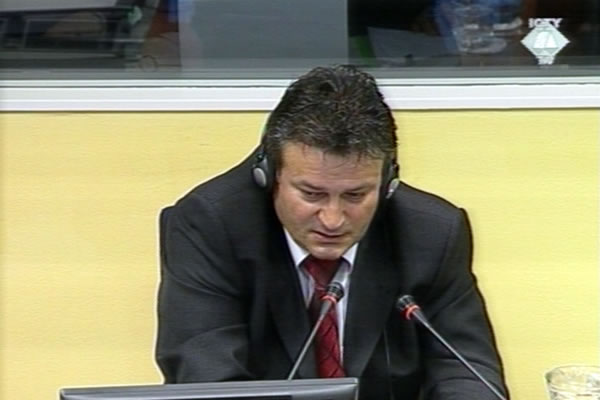Home
MARKAC’S DEFENSE RESTS ITS CASE
Tomislav Penic, the last witness of Markac’s defense, said that the Republic of Croatia showed its good will when it passed the amnesty law. The Serbs’ participation in the armed rebellion, their ‘fanaticism, shouting at roadblocks, concealing rifles’ were forgiven and forgotten. Franjo Tudjman brought up his days in prison in the debate about the amnesty law
 Tomislav Penic, defence witness of Mladen Markac
Tomislav Penic, defence witness of Mladen Markac The defense of police general Mladen Markac pointed to benevolent attitude of Croatian authorities towards Krajina Serbs who took part in occupation of parts of Croatia. Markac’s defense called its last witness, former government official Tomislav Penic. As Croatian deputy minister of justice Penic worked on drafting and implementing of General Amnesty law. This law regulated certain criminal acts perpetrated during or related to the armed conflict including acts of participating in armed rebellion against the Republic of Croatia. Many Serbs in Krajina faced such charges.
The first amnesty law was passed in September 1992. It was later amended to cover the period until the spring of 1996: all Serbs under arms until the end of Operation Storm were amnestied under the law. Penic explained that the amnesty was not granted to those who committed war crimes or ordinary crimes not related to the armed conflict. The legislator intended to grant amnesty to Serbs in Croatia because they had been misled and manipulated. They and other government representatives often said in public that ‘Serbs’ fanaticism, shouting at roadblocks, and concealing rifles’ would be forgiven and forgotten, Penic said.
The witness said that ‘when Croatia was in flames’, amnesty was a very delicate issue, but the authorities nevertheless passed the amnesty law. Penic highlighted President Tudjman’s role in the process. ‘We have to forgive. After all, I was in prison too and I don’t know if the prison made me better’, Tudjman said to Penic at a meeting.
Penic didn’t only take part in drafting the law: he was there to implement it. To that purpose, Penic went twice to the UN base in Knin immediately after Operation Storm. Among some 1,000 Serbs who had sheltered there, seventy were war crimes suspects. Penic’s task was to disclose to them the evidence against them. A number of suspects refused to receive the documents. Penic says that General Cermak received him in Knin and provided him with all the assistance he needed. According to Penic, Cermak wasn’t there when he talked to the UN representatives and Serb suspects. The witness noted that all those who were not under investigation could leave the base without any problems and return to their homes.
After a very brief cross-examination, Tomislav Peric completed his evidence. The defense of third-accused, General Mladen Markac, thus rested its case. Markac is on trial together with Ante Gotovina and Ivan Cermak for crimes during and after Operation Storm in the summer of 1995; the aim of the crimes was to expel Serbs from Krajina.
There will be an administrative hearing at the trial of the three Croatian generals tomorrow.
Linked Reports
- Case : Gotovina et al. - "Operation Storm"
- 2010-01-18 NEW OR FABRICATED FACTS ABOUT GRUBORI?
- 2010-01-14 FEW INCIDENTS IN LARGE-SCALE SEARCH
- 2010-01-13 DEFENSE EXPERT: ‘SPECIAL UNITS DIDN’T CONTROL TERRITORY’
- 2010-01-27 THE TRIAL CHAMBER CALLS WITNESSES AT THE OPERATION STORM TRIAL
- 2010-02-05 TRIAL CHAMBER: ‘EU SHOULD DELIVER A MORE DETAILED REPORT’
- 2010-02-18 KNIN EC MONITORS’ LOGBOOK NOT IN EU ARCHIVES
